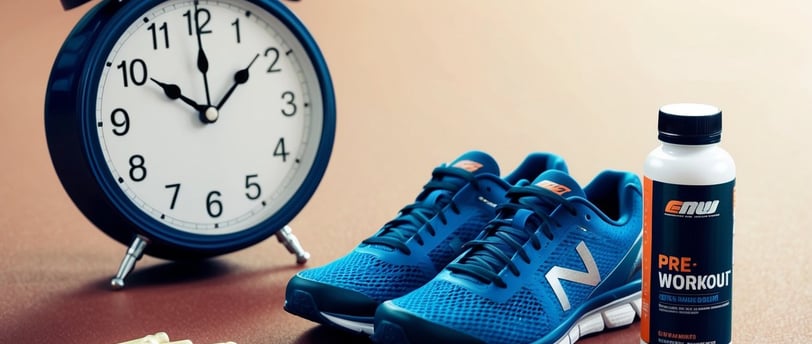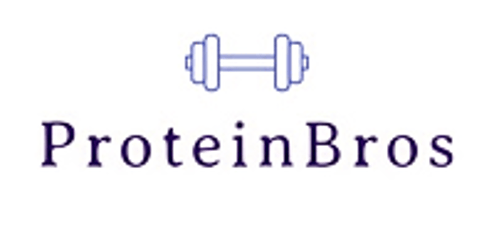
What is the best time to take pre workout? Optimal timing for maximum performance
Pre-workout supplements have become increasingly popular among fitness enthusiasts looking to maximize their exercise performance. These products typically contain ingredients like caffeine, amino acids, and other stimulants designed to boost energy, focus, and endurance during workouts...
1/29/20257 min read


Pre-workout supplements have become increasingly popular among fitness enthusiasts looking to maximize their exercise performance. These products typically contain ingredients like caffeine, amino acids, and other stimulants designed to boost energy, focus, and endurance during workouts.
Timing is crucial when it comes to pre-workout consumption. The optimal time to take pre-workout is approximately 30 minutes before beginning exercise. This allows the ingredients to be absorbed and take effect, providing the desired boost as the workout begins.
Individual factors can influence the ideal timing for pre-workout intake. Some people may metabolize the ingredients more quickly or slowly, affecting how soon they feel the effects. Experimenting with different timing windows can help determine what works best for each person's unique physiology and workout schedule.
Understanding Pre-Workout Supplements
Pre-workout supplements are designed to enhance exercise performance and provide an energy boost. They contain various ingredients that aim to improve focus, endurance, and strength during workouts.
Definition and Purpose
Pre-workout supplements are dietary products consumed before exercise to boost performance. They typically come in powder form, mixed with water or juice. These supplements aim to increase energy levels, improve focus, and enhance physical output during training sessions.
Pre-workouts often contain stimulants like caffeine to provide a quick energy boost. Some formulations include ingredients that may support muscle endurance and reduce fatigue. The primary goal is to help users maximize their workout intensity and achieve better results.
Key Ingredients
Common pre-workout ingredients include:
Some pre-workouts contain branched-chain amino acids (BCAAs) to support muscle recovery. Nitric oxide boosters like arginine or citrulline are often included to improve blood flow and muscle pumps.
It's important to note that ingredient combinations and dosages vary between products. Users should always check labels and consult with a healthcare professional before starting any new supplement regimen.
The Relationship Between Timing and Performance
The timing of pre-workout consumption significantly influences exercise performance. Proper timing can enhance energy levels, focus, and endurance during workouts.
Digestion and Absorption Rates
Pre-workout supplements contain various ingredients that are absorbed at different rates. Caffeine, a common stimulant, typically takes 30-60 minutes to reach peak blood levels. Beta-alanine and creatine may require longer periods to be fully effective.
Consuming pre-workout too close to exercise can lead to digestive discomfort during training. Conversely, taking it too early may result in diminished effects by the time the workout begins.
For optimal absorption, most experts recommend taking pre-workout 20-30 minutes before exercise. This allows enough time for ingredients to enter the bloodstream without causing stomach issues.
Impact on Workout Intensity and Duration
The timing of pre-workout intake directly affects workout intensity and duration. Taking it at the right moment can boost energy levels, enabling higher-intensity training sessions.
Studies show that properly timed pre-workout consumption can increase power output and endurance. Athletes often experience improved focus and reduced perceived exertion during their workouts.
For longer training sessions, timing becomes crucial. Taking pre-workout too early may lead to a mid-workout energy crash. Some individuals prefer splitting their dose, consuming half before and half during their workout for sustained performance.
Experimentation with timing can help determine the optimal schedule for individual needs and workout types. Factors like metabolism and supplement composition play roles in finding the ideal pre-workout timing.
Optimal Timing Strategies
The timing of pre-workout consumption plays a crucial role in maximizing its benefits. Proper timing can enhance energy levels, focus, and overall performance during exercise.
General Guidelines for Pre-Workout Timing
For most people, taking 20-30 minutes before exercise is ideal. This allows the ingredients to be absorbed and take effect by the time the workout begins. Some individuals may prefer consuming it 45-60 minutes prior, depending on their metabolism and sensitivity to stimulants.
Consistency is key. Sticking to a regular pre-workout routine helps the body adapt and respond more effectively over time. It's important to avoid taking pre-workout too close to bedtime, as it may interfere with sleep quality.
Hydration is crucial when using pre-workout supplements. Drinking water before and during exercise helps prevent dehydration and supports optimal performance.
Variability Based on Ingredients
Different pre-workout formulas contain various ingredients, which can affect optimal timing. Caffeine, a common stimulant in pre-workouts, typically takes 30-60 minutes to reach peak effectiveness. Beta-alanine may cause a tingling sensation, so some users prefer taking it earlier to allow this feeling to subside before exercising.
Creatine-containing pre-workouts might benefit from longer absorption times. Taking these 60-90 minutes before a workout can ensure maximum uptake. Nitric oxide boosters, like citrulline or arginine, often work best when taken 30-60 minutes pre-exercise.
For multi-ingredient formulas, consider the primary components and their individual timing requirements. Experimenting with different timing strategies can help identify the most effective approach for personal needs and preferences.
Individual Considerations
The optimal time to take pre-workout supplements varies based on personal factors and fitness objectives. These individual factors play a crucial role in determining the most effective timing for each person.
Personal Metabolism
Metabolism rates differ among individuals, affecting how quickly the body processes pre-workout ingredients. Some people may experience the effects within 15-30 minutes, while others might need up to an hour.
Fast metabolizers should take pre-workout closer to their exercise time to maximize benefits during training. Slow metabolizers may benefit from consuming it earlier to ensure peak effectiveness coincides with their workout.
Age, body composition, and overall health can influence metabolism. Younger individuals often have faster metabolisms, potentially requiring less time between ingestion and exercise.
Specific Workout Goals
Different fitness objectives may necessitate varied pre-workout timing strategies. Strength training goals might benefit from taking pre-workout 30-45 minutes before exercise to enhance power output and muscle endurance.
For endurance activities like long-distance running, consuming pre-workout 45-60 minutes prior can help sustain energy levels throughout the session. This timing allows for optimal absorption and utilization of ingredients during extended workouts.
High-intensity interval training (HIIT) may require a shorter window, around 20-30 minutes, to align peak ingredient effectiveness with the intense bursts of activity.
Athletes focusing on explosive movements or sprints might prefer taking pre-workout closer to their training time for immediate energy boosts.
Scientific Research Findings
Scientific studies have examined the optimal timing and effectiveness of pre-workout supplements, as well as ingredient-specific timing considerations.
Studies on Timing and Effectiveness
Research suggests taking pre-workout supplements 30-60 minutes before exercise may be most effective. A study in the Journal of the International Society of Sports Nutrition found peak blood levels of caffeine occur 60 minutes after ingestion.
Another study in the Journal of Strength and Conditioning Research showed improved performance when subjects consumed pre-workout 30 minutes before training.
Timing can vary based on individual factors like metabolism and tolerance. Some people may feel effects sooner, while others need more time.
Research on Ingredient-Specific Timing
Different pre-workout ingredients have unique absorption rates and onset times. Caffeine typically takes 45-60 minutes to reach peak blood levels. Beta-alanine may require 30-45 minutes to take effect.
Creatine timing is more flexible. While some take it pre-workout, research shows consistent daily intake is most important for long-term benefits.
Citrulline malate may be most effective when taken 60 minutes before exercise, according to a study in the Journal of Strength and Conditioning Research.
Practical Tips for Pre-Workout Consumption
Optimizing pre-workout consumption involves careful timing and preparation. Proper meal planning, nutrient timing, hydration, and supplement selection can significantly enhance workout performance and results.
Meal Planning and Nutrient Timing
Consume a balanced meal 2-3 hours before exercising. This meal should include complex carbohydrates, lean protein, and healthy fats. Good options include whole grain toast with avocado and eggs, or oatmeal with berries and Greek yogurt.
For early morning workouts, eat a light snack 30-60 minutes before. Choose easily digestible carbs and a small amount of protein. Examples include a banana with peanut butter or a small smoothie.
Avoid heavy, fatty, or high-fiber foods close to workout time. These can cause digestive discomfort and hinder performance.
Hydration and Pre-Workout Formulas
Drink 16-20 ounces of water 2-3 hours before exercise. Follow up with 8-10 ounces 20-30 minutes before starting.
If using a pre-workout supplement, take it 20-30 minutes before training. Start with a half dose to assess tolerance.
Choose pre-workout formulas based on individual needs. Caffeine-sensitive individuals should opt for stimulant-free options.
Stay hydrated during the workout. Aim for 7-10 ounces of fluid every 10-20 minutes of exercise.
For longer sessions, consider adding electrolytes to your water or using a sports drink to replenish lost minerals.
Potential Side Effects and Safety Considerations
Pre-workout supplements can cause various side effects and carry certain health risks. Users should be aware of common reactions and potential long-term impacts.
Common Side Effects
Pre-workout supplements often contain stimulants like caffeine, which can lead to jitters, anxiety, and increased heart rate. Some users experience headaches, nausea, or digestive discomfort.
Tingling or itching sensations, known as paresthesia, may occur due to beta-alanine, a common ingredient. This effect is typically harmless but can be unpleasant for some individuals.
Dehydration is another concern, as caffeine has diuretic properties. Users should increase water intake to counteract this effect.
Sleep disturbances can happen if pre-workout is taken too late in the day. The stimulant effects may interfere with normal sleep patterns.
Long-Term Health Impacts
Regular use of pre-workout supplements may lead to caffeine tolerance, reducing their effectiveness over time. Some users might experience adrenal fatigue from constant stimulant intake.
High doses of certain ingredients can strain the liver and kidneys. Long-term use of creatine, for example, may impact kidney function in some individuals.
Cardiovascular health is another consideration. Prolonged use of stimulants can potentially increase blood pressure and heart rate.
Some pre-workout supplements contain proprietary blends with undisclosed amounts of ingredients. This lack of transparency makes it difficult to assess long-term safety.
Users with pre-existing health conditions should consult a healthcare professional before using pre-workout supplements regularly.
Conclusion
Timing pre-workout intake properly can significantly enhance exercise performance and results. Tailoring consumption to individual needs and workout schedules is key.
Final Recommendations
For most people, taking pre-workout 30-60 minutes before exercise is ideal. This allows ingredients to reach peak effectiveness during training. Those with sensitive stomachs may benefit from consuming it 60-90 minutes pre-workout.
Morning exercisers should take pre-workout on an empty stomach or with a light snack. Evening gym-goers can take it 2-3 hours after a meal. Hydration is crucial - drink plenty of water with pre-workout supplements.
Experiment to find the optimal timing for your body and routine. Start with smaller doses to assess tolerance. Avoid taking pre-workout too close to bedtime to prevent sleep disruptions.
Encouragement for Consistent Practice
Consistency is vital for reaping the full benefits of pre-workout supplements. Establish a regular intake schedule aligned with your workout routine. This helps maximize energy levels and performance gains over time.
Track your progress and adjust timing as needed. Pay attention to how your body responds and fine-tune accordingly. Remember, pre-workout is a tool to enhance workouts, not a substitute for proper nutrition and rest.
Stay committed to your fitness goals. Combine pre-workout supplementation with a balanced diet and adequate sleep for best results. With consistent practice, you'll likely notice improved endurance, focus, and overall workout quality.
Additional info
Social media coming soon!
Contact us
Newsletter coming soon!
© 2024. All rights reserved.
